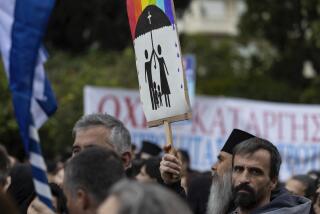COLUMN LEFT/ RUTH ROSEN : Democracy for Men, Mostly, East and West : The revolutions of ’89 were incomplete; women have lost what protection they had.
- Share via
To judge from the American media, you would think that all of East-Central Europe is enchanted by the prospect of instant privatization and unbridled capitalism. Economists and foundations scramble all over each other to spread the gospel of salvation through free markets. Just because state communism proved to be such a political, economic and spiritual catastrophe, however, doesn’t mean that capitalism is the panacea for the human condition.
Such was the opinion expressed by 45 women from Bulgaria, Romania, Czechoslovakia, Poland and the former East Germany who recently met in Dubrovnik with 15 veteran American feminists for the first international meeting of the Network of East-West Women. Journalists and educators, these women are the new dissidents in East-Central Europe, concerned with protecting the vulnerable--the old, the ill, workers and women--from the ravages of capitalist shock therapy and the misogynistic appeal of Christian renewal and anti-abortion movements.
The revolutions of 1989, said Sonja Licht, a Yugoslavian feminist sociologist, are incomplete. They are “male democracies.”
Infatuated by the idea of free markets, the current political atmosphere supports the dismantling of the many social welfare policies that protected women and children. Some stories from the trenches:
-- The former head of Solidarity’s women’s bureau explained why she quit her job. “In the early ‘80s, Solidarity actively recruited women and supported their rights. Now, they have capitulated to the church and nationalistic yearnings to restore the ‘traditional’ family.” Polish women, who are disproportionately affected by unemployment, have been confronted with “forced retirement.” Their return to hearth and home is justified by no more than the myth of a future wage for men that would support an entire family.
-- A Bulgarian teacher with sad eyes quietly said: “We are lost. We used to have the security of a job, an apartment and health care. I hated communism, but now women and children have no security at all; they are falling in the cracks.”
-- A Czech journalist described how all the ethnic groups have tried to coerce women to raise the birth rate. “All these nationalistic groups view us as breeders, nothing more.”
-- A Yugoslavian writer explained why feminism is a four-letter word: “It is contaminated by media-generated distortions of Western feminism.” With the ghost of totalitarian states haunting the democratic opposition, it is difficult even to bring up the subject of women’s needs without sounding “too much like a Communist.”
-- A Czech family therapist recounted the social impact of unemployment. Husbands succumb to alcoholism and despair; young women emigrate to Yugoslavia to work as prostitutes. That night, I saw a group of Czech go-go dancers plying the streets of the old walled city of Dubrovnik.
The obstacles facing these women are formidable. Ethnic passions for larger populations keep contraceptives off the shelf and fuel anti-abortion campaigns already strongly supported by the Catholic Church and, as it turns out, well-funded by American right-to-life groups. Christian renewal groups deluge the media with glorified portrayals of the “traditional patriarchal family.”
When asked to support women’s needs as housewives or workers, or to protect their reproductive choices, the brave men who helped topple the old regimes now respond, “We must build democracy first.” A familiar refrain. It used to be, “We must build socialism first.”
The vast majority of East European women, moreover, are starved for consumer goods and time with their families, distrustful of politics in general, and don’t want to be organized--for anything, or by anyone.
Despite enormous differences, we American feminists and our East European counterparts found ourselves united by a number of issues. Both groups want social-welfare policies that don’t force women either to work or to stay at home. In addition, all the women vowed to fight against male violence, as well as assaults on abortion.
“Women live badly and don’t know it,” a Bulgarian woman said to me as we parted. I was immediately flooded by images of American women living on the streets. The Supreme Court’s “gag ruling” on abortion still filled me with indignation. I waved goodby and replied, “In my country, too.”
More to Read
Sign up for Essential California
The most important California stories and recommendations in your inbox every morning.
You may occasionally receive promotional content from the Los Angeles Times.












